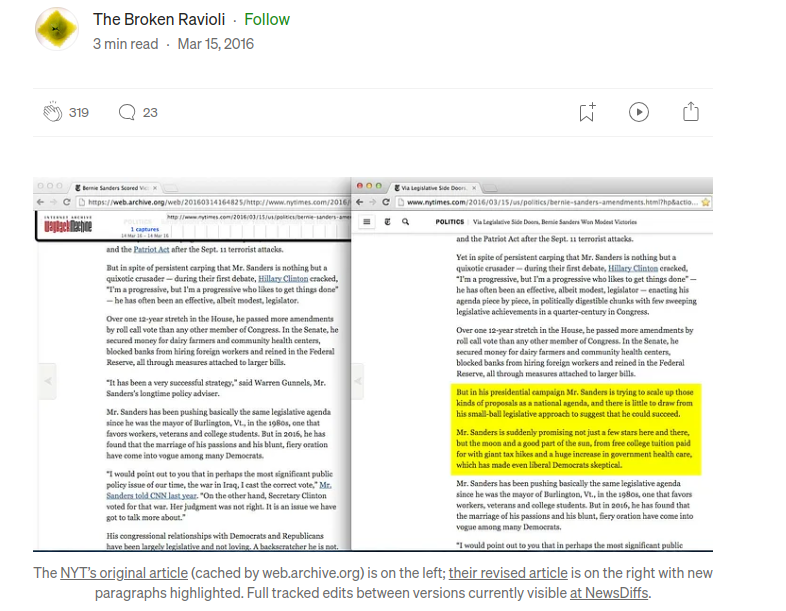- cross-posted to:
- news
- cross-posted to:
- news
Hot take: We need a middle ground between free unfettered access to journalism and total pay wall restrictions. Physical libraries do this well. Digital content is a lot more complicated. Maybe Internet Archive should only be able to publish content that’s over X years old? Thoughts?
There has been a long fight to get academic papers whose funding sources came from the government to be made open access, with the justification that the people who literally paid for the research should be able to read it. We’re not talking national security here - we’re talking about fruit flies and black holes and such.
The last time I checked, they agreed to make all government funded research open access after (I think) one year. I still think that’s ludicrous, but o see that as being analogous to what is being proposed here.
If we were to check the average number of times the average news article is accessed after publication, I bet it would fall off a cliff after the first couple of days at most. Some might have more staying power, but I bet 90-95% of them basically never get touched again. I’m sure you could take the number of people who buy a subscription on the basis of needing to read a three month old article and figure out a different way to make back the $100/month or whatever they’d lose on just opening access.
And that’s why I’m not pretending I have the solution. Details have to be sorted out.
Removed by mod
DRM at best makes it take more effect to access - a hurdle to entry. In this day and age it has never been easier for regular people to copy, and trying to fight that is an uphill battle in a war they aught to stop anyway.
DRM is a black box of software, doing god-knows-what. That gives them unjust power over users’ computing. DRM manages “rights” by denying people’s software freedoms. DRM is digital restrictions management.
Publishers put ridiculous rules in place for digital content. Libraries typically need to pay the full cover price for an ebook and it expires after 1-2 years. So not only can libraries not receive donations of used ebooks like they can physical books, they are also restricted by the limited life span. Sure, physical books experience wear and tear, but that’s built up through use. A less popular book could sit on the shelf for a long time and not degrade substantially, but an ebook could go without being checked out once and it will still expire.
If I’m buying an ebook from a DRM enabled bookstore, there is no reason why I should not be able to sell the book or donate it to a library when I’m done.
Wrong!
Because money!
All good points. That’s the kind of middle ground I’m talking about. A first sale doctrine for digital. Expiring DRM would be like renting. But if they sell the book to individuals they should sell it to libraries.
The “middle ground” is for publishers to back the fuck off and let libraries do their goddamn jobs.
Why is that position in the middle? Because the extreme position is that the publishers have broken the social contract – which was for Congress to grant them the privilege of a temporary monopoly in exchange for enriching the Public Domain in the long run – and thus no longer deserve to have copyrights at all.
Digital is a completely different paradigm. If an online library has unlimited copies of a book, why would anyone buy it? New books won’t be written is no one pays for them.
The middle ground is for them to remove all VC and corporate entities trying to make billions off of journalism while journalists make scraps. We should have federal and state funds that go to journalists and also have a donation model for people to be able to donate easily. Journalism shouldn’t be behind any paywalls though especially in the age if misinformation, deepfakes, etc where all the propaganda and misinformation is freely available and much easier to share
That’s not a middle ground, it’s a complete upheaval of the economy. A tall order to say the least.
Sure, where x=0.
The point here is accountability, not free as in free beer.
Hold on, so… OK. No free beer?
grabs jacket off the stand
Have a nice dayI don’t follow
You made a statement with an undefined term “x.” I defined “x” for you. Substitute 0 for x in your statement, and think about it for a bit.
I understand the math, thanks. I’m talking about what you meant by accountability.
The publication needs to be held accountable for its unethical edits, which seems to only be possible thanks to a resource like this archive.
Ok, you’re talking about something entirely different. There could be a way to show edits without giving away the entire content of the article for free. That’s valid.
Yeah, that would make sense, the publish delay could even be as short as a month for things like news, as their value comes from them being relevant.
their value comes from them being relevant
The news’s value should be to society, though, not shareholders?
Maybe? We’re talking about a paradigm shift in copyright at a time where it’s harder and harder for traditional journalism to survive. I fear if we take such hardline stances on whether or not this information is freely accessible, we will lose it outright. Propaganda is always free. The truth has costs.
Right, the whole original point of copyright in the US at all was “to promote the creative arts” - that they were finding that if there wasn’t at least SOME time for people to try to profit off of stuff they wrote/made, there was way way less motivation for people to put in the effort. It’s been twisted a good bit since, but the core idea isn’t nonsense, at all.
Same with real journalism. Don’t see how people expect it to be done for free. For the past several hundred years it’s been normal to pay a modest fee for news.
I agree with you and was also thinking that maybe waiting X days/weeks before publishing would be the solution.







